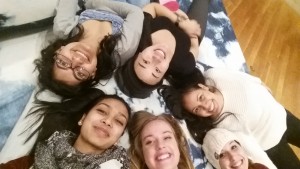Last week, Professor Schwarz came to the Rose Scholars Cafe to talk about his novel and go through some of the topics that he writes about. Interestingly enough, I am a mentor that suggests tips on how to survive high school and it was nice to hear about how to survive college. I enjoyed hearing his narratives and how every student differently depending at what level they are in their career.
I really enjoyed how much I could relate to what he was saying. The transition to college isn’t easy but it gets easier with time. Each year in college also gets better in some regard and each year is definitely more knowledgeable than the last in terms of knowing yourself. I’ve always viewed education a self-discovery journey; we learn who we are, what e can handle and who we want to be. From freshman year not having a clue to sophomore year feeling more comfortable, then junior year securing opportunities and then senior year having to say “hello” to a new chapter in our lives, college is certainly a journey. Even after college the learning continues and we become real adults.
At the end of the day, it really isn’t about your GPA; it’s about what experiences you’ve had that shaped you and make you stand out and I honestly enjoyed this talk!

